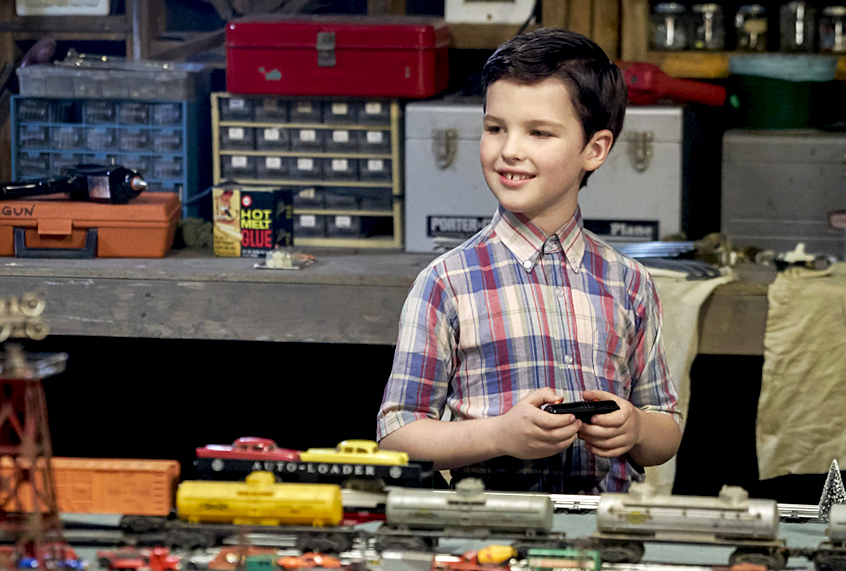As if the brand potency of “The Big Bang Theory” needed further proving, its spinoff “Young Sheldon” debuted to gargantuan numbers Monday night on CBS, making it the biggest comedy premiere in four years. (Read our review.)
How huge was it? According to Nielsen’s final broadcast primetime live plus same day ratings, 17.2 million viewers tuned in to see the nine-year-old version of Sheldon Cooper (played by Iain Armitage) in his wonder years. That number includes an impressive 3.8 rating among the adults 18-49 demographic that’s most desirable to advertisers. Even more importantly, “Young Sheldon” maintained 98 percent of the total audience from its lead-in, “The Big Bang Theory,” which entered its 11th season to the tune of 17.7 million viewers and 4.1 in the target demo, its highest tick since December 2015.
Following this massive viewership victory, CBS officially picked up “Young Sheldon” for a full season. This makes it the first new series to get a shot at seeing the light of May — and it’s only Wednesday.
The one-two combo of “The Big Bang Theory” and “Young Sheldon” handily knocked out “The Voice,” returning for its 13th cycle to ratings that were 20 percent lower than last year’s fall debut, with an audience of 10.57 million.
Launching successful broadcast sitcoms is a tough business these days, especially in recent seasons. For evidence of this, see the poor sampling for “Me, Myself & I.” Same network, same night, later time period and no marketing synergy with its lead-in, “Kevin Can Wait,” led to an opening audience of 7.46 million.
In fact, the huge success of “The Big Bang Theory” is something of an anomaly. The top of the Nielsen ratings charts has long been dominated by dramas and reality series, save for “The Big Bang Theory,” which ended the 2016-2017 series as the most-watched scripted show and the top-rated scripted broadcast show among adults 18-49.
“Modern Family” tends to be the second most popular network comedy. From there it’s a steady climb down the ratings chart to find where other broadcast half-hours rank.
CBS has been dominant in the comedy space for several seasons now, thanks to “The Big Bang Theory,” a show that slays in the ratings in first-runs and in repeats. As such, the network moves it between Monday and Thursday nights to launch new series and shore up surrounding titles.
“Big Bang” is one of television’s easiest sells. Hence, hopes have been high for “Young Sheldon” since CBS unveiled its fall lineup to advertisers at its Upfronts presentation in May. And CBS’ optimism was confirmed barely a week after the series’ official pickup was announced, when the network reported that the trailer had racked up more than 22 million views across on Facebook, Twitter and YouTube.
Ordinarily, this is when those of us who have been taking the pulse of television for many seasons would caution against premature exuberance. “Young Sheldon” may be the most-watched comedy premiere since “2 Broke Girls” came on the scene in 2011 – and look at how long that one lasted! And, it was terrible!
It’s also the highest-rated premiere since the bow of “The Crazy Ones” in 2013, which starred Sarah Michelle Gellar and Robin Williams and snuffed out after one season. The catacombs of TV history are littered with the bones of countless series that premiered to high numbers, only to fade away quickly after that.
“Young Sheldon” has a high probability of bucking that trend because of its legacy. If it does, the series’ success will also mark a thematic turn for CBS’ Monday night comedy block in becoming a successful single-camera comedy on a network with a history of favoring multi-cams.
“The Big Bang Theory” spinoff differs from its progenitor in terms of tone, in that it’s slightly melancholic, wears its heart on its sleeve and doesn’t make the characters’ pain with punchlines or a laugh track. But this weightiness is leavened by Armitage’s performance; the child actor conveys Sheldon’s self-assurance and social cluelessness with flawless command and exhibits a winning chemistry with Zoe Perry, who plays Sheldon’s mother Mary.
The premiere’s stunning level of audience retention should not come as a shock either. The 11th season premiere of “The Big Bang Theory” resolved last season’s romantic cliffhanger, which left off with adult Sheldon (Jim Parsons) asking his long-suffering girlfriend Amy Farrah Fowler (Mayim Bialik) to marry him. Viewers are suckers for a potential wedding, especially one involving an adored character at the center of a long-running series.
Few events make a person receptive to dewy-eyed nostalgia like a proposal, so of course the majority of “Big Bang” viewers stuck around to see where television’s King of Nerds started. And the “Young Sheldon opener proves he’s come a long way from geeking up East Texas.
Bowing with a bang, though quite an accomplishment, doesn’t mean success is assured. Keep an eye on the ratings for “Young Sheldon” in the weeks to come, specifically its second and third weeks. Post-premiere viewership drop-off is inevitable, but as long as the percentage of loss isn’t significant, expect the kid to stay in the picture.
CBS isn’t taking chances, though, and “Young Sheldon” won’t stray far from its parent series. When “The Big Bang Theory” moves to its regular Thursday night time period on November 2, little “Sheldon” is tagging along with it.

